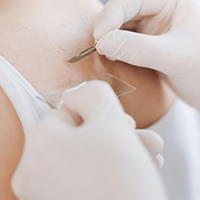
Seeing changes in your skin and hair during menopause? You are not alone, the hormonal changes that come with menopause can bring on a multitude of skin and hair changes.
Dermatologist and Fellow of the Australasian College of Dermatologists, Dr Jo-Ann See discusses exactly what happens to your skin and hair during menopause and how with the right care, you can lessen these effects and when it may be time to seek medical help.
How menopause affects your hair and skin
If you are seeing changes in your skin and hair in menopause, this is usually a result of decreases in the hormones estrogen and progesterone.
Estrogen promotes water retention and plumpness in the skin. When your estrogen levels start to fall, you lose some of the molecules that help keep skin moisturised. This means that alongside hot flushes and night sweats, you can experience dry skin, flakiness and itching, or dark spots and acne breakouts. You may also notice that your skin is less plump and takes longer to heal. Some people also experience vaginal dryness and itch.
Caring for your skin and hair
When it comes to your skin, it is important to maintain a healthy skin barrier. Use a gentle cleanser rather than a scrub and regularly apply moisturiser to your face and body especially during the winter months. Sun protection is also important as it can help to lessen skin ageing and prevent skin cancer. For more information, visit our sun protection page.
In menopause you may also experience an itchy scalp, hair loss and thinning, thinning of pubic hair and increased facial hair. These symptoms can be distressing but it is important to know that help is available.

Seeking help
Your General Practitioner (GP) can diagnose and help treat many of your symptoms and we always recommend visiting your GP in the first instance.
A referral to a dermatologist may be needed especially if there is persistent skin dryness or the development of dermatitis or skin irritation that is difficult to control. Dermatologists can also help with excess facial hair and thinning scalp hair.
Dermatologists are specialist medical doctors specifically trained in conditions of the skin, hair, nails, wet areas of the mouth and genitalia.

A list of dermatologists is available on the ACD website with a number of dedicated hair clinics. You can find out more about what a dermatologist is and how to see one on our Community pages.
Referral to a menopause clinic or gynaecologist can also be helpful and there are several dedicated menopause clinics in hospitals around the country. The Australian Menopause Society website has further information.
Dr Jo-Ann See is a dermatologist and Fellow of the Australasian College of Dermatologists

